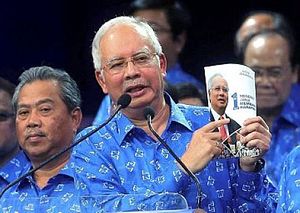Malaysia’s Najib Razak made history by becoming the country’s first Prime Minister to sue a media organization for libel. The case, however, is rather odd since Najib’s lawyers are claiming that he was defamed by the comments made by readers of the Malaysiakini news website. In other words, Najib is suing Malaysiakini editors not for publishing a libelous news story but for allowing libelous comments to be posted on their website.
Malaysiakini is an independent and award-winning news website. It applied for a license to publish a newspaper but was denied by the government in 2012.
The libel suit was filed after Malaysiakini refused to apologize and remove two “offending” Yoursay articles posted on its website last month. Yoursay is a section in Malaysiakini where comments on a particular news article are compiled into one news story.
Najib’s lawyers highlighted numerous inflammatory comments in the articles published by Malaysiakini. One of the comments, written by Anonymous #06188481, criticized the moral competency of Najib, suggesting the prime minister “has many skeletons in his closet.”
In response to the defamation suit, Malaysiakini editor-in-chief Steven Gan said the online portal will “fight the suit vigorously.” He added that Najib and his party could have availed of the right of reply law to answer the “unfair” comments made by readers without resorting to legal action.
Writer Nathaniel Tan underscored the uniqueness of Malaysiakini’s Yoursay section, where ordinary Malaysians are given the chance to freely express their thoughts. “It has for many years been a place like few others for Malaysians to vent and publish views which may otherwise never see publication – especially in any mainstream press.”
Then he reviewed the controversial comments that allegedly defamed Najib and concluded that they were probably popular views shared by many people. “They merely gave a space for readers to say what hundreds of thousands of Malaysians are probably saying in coffee shops all across the country.”
Malaysiakini has received a lot of support from media freedom advocates. Aliran, a human rights group, views the libel suit as “tantamount to instilling fear in other alternative media and their concerned readers.”
Benjamin Ismaïl of the Reporters Without Borders Asia-Pacific desk said the legal action has further undermined the state of free speech in the country.
“This libel action is disastrous for freedom of information in Malaysia because it means that any news outlet can be sued whenever it allow its readers to express their views. We urge the prime minister to reverse course and let people criticize him,” he said.
Amnesty International condemned the suit as another attack on the right to freedom of expression in Malaysia. It asked Najib to drop the libel case.
But Alyaa Alhadjri thinks Najib was also forced to file the suit to appease the hardliners in his party who have been clamoring for stronger measures against the harsh critics of the government. Najib is head of a political coalition which has been in power since the 1950s, but which has been receiving fewer votes and seats in recent elections.
The first hearing of the case is set for June 18. Regardless of the outcome, Najib’s decision to pursue legal action against an online news portal has done much to undermine Malaysia’s commitment to expanding and enhancing democracy.
Update:
The Prime Minister’s Department of the Malaysian government contests The Diplomat’s characterization of the material that is the subject of the legal action as “comments.” (The material in question can be found here and here.)
In a statement released on June 11, the government said:
“On 14 May 2014, Malaysiakini published two defamatory news articles entitled: ‘A case of the PM reaping what he sows’ and ‘How much will Najib spend to keep Terengganu?’.
“These articles – which were based on reader comments selected and then republished by Malaysiakini – made a slew of false and defamatory allegations against the Prime Minister; including insinuating his involvement in serious crime.
“After the articles were published, the Prime Minister’s legal team wrote to Malaysiakini and requested that the articles be removed and an apology issued. Malaysiakini refused, and instead published the private legal letter and further articles.
“The Prime Minister’s legal team therefore decided to take legal action against Malaysiakini for defamation.
“Malaysia has a free and open online media. A cursory glance at the online media shows its independence – news portals frequently criticise both the Prime Minister and the Government, and engage in robust political debate.
“The Prime Minister has frequently stated his commitment to protect the freedom of Malaysia’s online media. The defamation case does not undermine this commitment.”

































